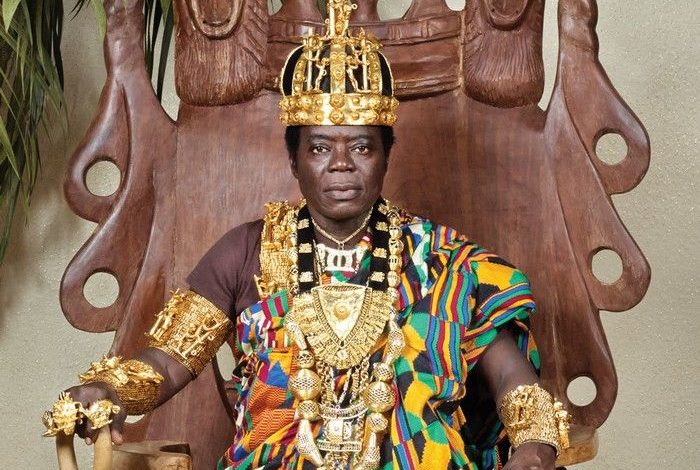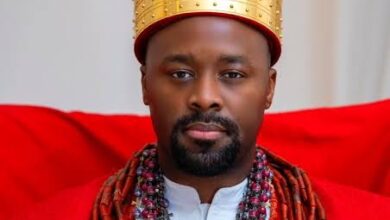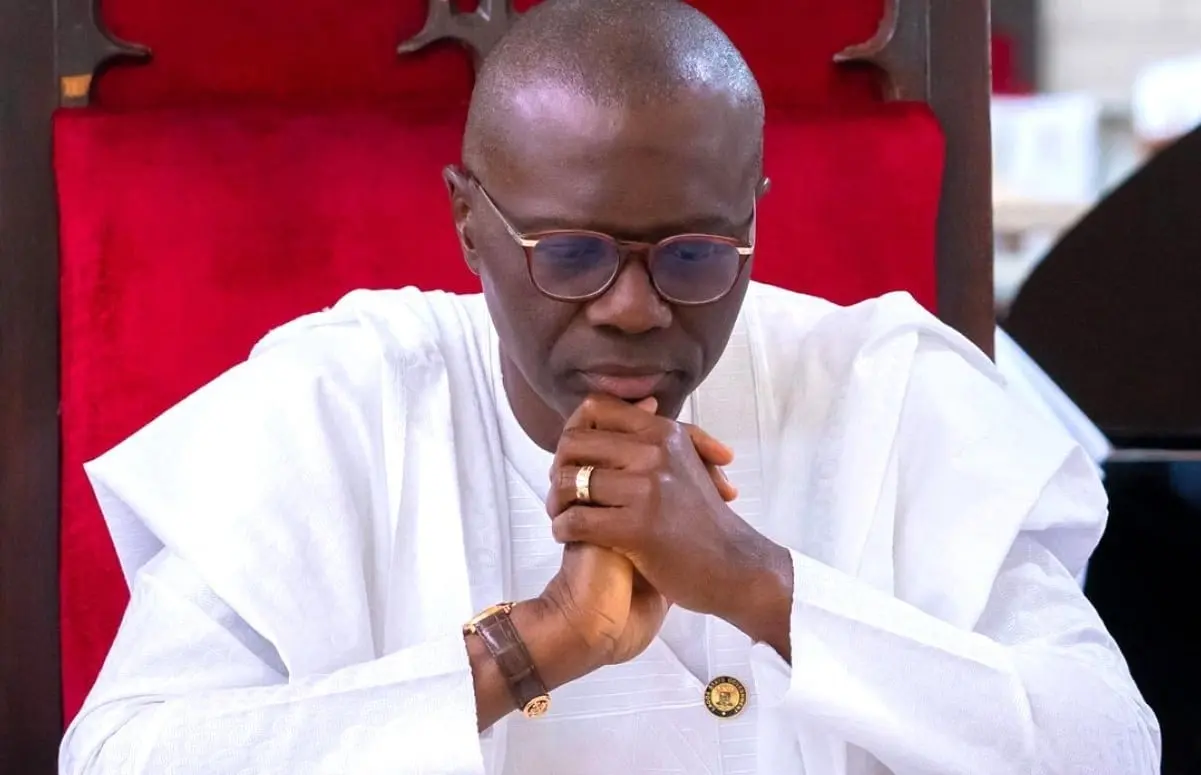African Majesty: The cultural radiance of kingdom and highness in Nigeria and Ghana Africa radiance

By Lidwine Meffo
I. Introduction

Africa, a continent full in rich cultural heritage and tradition, where the essence of royalty and majesty still lingers in the air. My personal journey has taken me on an
incredible path, allowing me to encounter the majesty of African kingdoms up close.
From the vibrant streets of Nigeria to the warm heart of Ghana, I’ve had the privilege
of immersing myself in the fascinating world of African royalty.
In this article, I’m thrilled to share my unforgettable experiences interacting with
highness and kings across Africa. From the warm reception by the King of Oyo Alaafin
in Nigeria, with his wise words and generous hospitality, to the heartfelt connections
with my dear friend, Your Highness Dr. Olusegui in Nigeria, and the revered Togbe Tsali IV, the Dufia (Chief) of Abutia Kpota in the Volta region of Ghana, with theirremarkable stories and infectious laughter, I’ve witnessed firsthand the immense love and honor bestowed upon these esteemed titles. Join me as I dive into the world of African royalty, where tradition, culture, and majesty reign supreme, and discover the beauty, grace, and timelessness of a continent that continues to captivate my heart.
Surely I am a humble proud African.
Both Nigeria and Ghana hold a special place in my heart. My work with the Nigerian
Mission to the United Nations has granted me the privilege of immersing myself in
their profound cultures, savoring their delicious food, and basking in the warm
ambiance and intense atmosphere of their vibrant cities. I’ve had the honor of
organizing numerous conferences and events across various regions of Nigeria,
including Ibadan, Lagos, and Abuja. Each region boasts its unique charm, with distinct
leaders and sacred traditions that set them apart.
Tsali IV, the Dufia (Chief) of Abutia Kpota in the Volta region of Ghana, with their
remarkable stories and infectious laughter, I’ve witnessed firsthand the immense love
and honor bestowed upon these esteemed titles. Join me as I dive into the world of
African royalty, where tradition, culture, and majesty reign supreme, and discover the
beauty, grace, and timelessness of a continent that continues to captivate my heart.
Surely I am a humble proud African.
Both Nigeria and Ghana hold a special place in my heart. My work with the Nigerian
Mission to the United Nations has granted me the privilege of immersing myself in
their profound cultures, savoring their delicious food, and basking in the warm
ambiance and intense atmosphere of their vibrant cities. I’ve had the honor of
organizing numerous conferences and events across various regions of Nigeria,
including Ibadan, Lagos, and Abuja. Each region boasts its unique charm, with distinct
leaders and sacred traditions that set them apart.
In Ghana, I had the privilege of living an even more vivid and unique experience. I was
humbled to be crowned a queen in the picturesque village, calling me MAMA
DUYINGOR II Of Abutia Kpota, Ho West District, Volta Region of Ghana. A
Development Queen Title Bestowed On An Astute Female Personality (MADAM
LIDWINE MEFFO) A Former United Nations Advisor. The people there are incredibly
warm and welcoming, with a serene and peaceful way of life that soothes the soul. I
received abundant love and blessings from the men and women of the village, who
shared with me the significance of leadership and what it means to be a king in their eyes. These experiences have left an indelible mark on my heart, and I cherish the
memories and lessons learned from my time in both Nigeria and Ghana.
1- The significance of African kingdoms.
The Guardians of Culture and Tradition
In Africa, kingdoms have long been the backbone of cultural heritage and traditional
values. These revered institutions have played a significant role in shaping the
continent’s history, identity, and sense of community. Beyond their symbolic
significance, African kingdoms continue to hold immense importance in modern times.
For example in Nigeria Alaafin king said that Kingdoms serve as guardians of Africa’s
rich cultural diversity, preserving ancient customs, rituals, and practices. They ensure
the continuation of traditional arts, music, and dance, passing them down to future
generations like his older son.
– Kingdoms are also Symbols of Unity. Monarchs and royal families embody
national identity, fostering a sense of unity and shared purpose among their
people. They represent the nation’s history, values, and aspirations, transcending political and ethnic divides.
– Economic and Social Development are also in my opinion a role to play here.
Kingdoms often drive local economic development through initiatives like
tourism, agriculture, and education. They also support social welfare programs,
providing aid to vulnerable communities and promoting social justice.
– African kingdoms are Bridging the Past and Present seamlessly blending tradition with modernity, demonstrating the continent’s capacity for innovation and adaptation. They show that progress and heritage are not
mutually exclusive, but rather complementary aspects of Africa’s growth
2. Overview of the article’s focus on Nigeria and Ghana. Nigeria vibrant culture is a dynamic fusion of traditional practices, Islamic and Christian influences, and modern creativity. The country’s over 250 ethnic groups, including the Hausa, Yoruba, and Igbo, each contribute their unique customs, music, and art to the national identity. Nigeria’s iconic Nollywood film industry showcases the country’s storytelling prowess, while the Afrobeat rhythms of Fela Kuti and contemporary artists like Davido and Tiwa Savage have put Nigerian music on the global map. The country’s cuisine is a flavorful blend of spices, peanuts, and aromatic spices, with popular dishes like jollof rice, suya, and egusi soup which is my favorite.
From the colorful textiles of Various fabrics and ankara to the magnificent bronze
sculptures of the Benin Kingdom, Nigeria’s culture is a testament to the country’s rich
heritage, resilience, and innovative spirit.
Ghana’s rich cultural heritage is a vibrant tapestry of traditional practices, warm
hospitality, and vibrant arts. The country’s diverse ethnic groups, such as the Ashanti,
Fante, and Ewe, each contribute their unique customs, music, and dance to the
national identity. Ghana’s famous kente cloth, adorned with symbolic colors and
patterns, is a staple of cultural pride who has been worn even by Michelle Obama
former First Lady of America as well as Prince Harry during his last visit with his
spouse, while the resonant drums and rhythmic movements of traditional dances like azonto and highlife have captivated audiences worldwide. Ghanaian cuisine, too, is a flavorful blend of spices, herbs, and fresh ingredients, with popular dishes like jollof
rice, fufu, and my favorite sour banku. From the bustling markets to the stately palaces, Ghana’s culture is a living, breathing celebration of community, creativity, and resilience.
II. Historical Context
1. A brief history of the kingdoms in Nigeria (e.g., Oyo, Benin, Hausa) and Ghana (e.g., Ashanti, Dahomey)
I still vividly remember my visit to the Alaafin of Oyo years ago. His granddaughter
was a friend of mine at the time, and we were warmly received at the palace. As we
arrived, the sound of drums filled the air, announcing our arrival. We entered the
grand gates and waited in a sophisticated room with a stunning red eagle chair
adorned with gold. The setting was designed to ensure that no one could directly gaze
at the king. After a 30-minute wait, we were summoned inside. The Alaafin greeted
my friend and me warmly, even joking that he would make me one of his wives, which
left us all in stitches. He then retreated to a private room with my friend for a lengthy
chat. I requested a souvenir, still in awe of being in a place I had only seen on TV. The
Alaafin returned with a piece of gold, leaving me speechless. He told me that I was
blessed by the angels of God. Our time with the king was limited, but the experience
was unforgettable. As we bid farewell, his guard asked us to greet him goodbye. I
requested a photo, and the Alaafin graciously stepped out with us. The sight of people
bowing down as he emerged was a testament to his revered status. It was truly a
special lifetime experience.”
When I reflected on my visit to the Alaafin of Oyo, I realized that it was more than just
a meeting with a monarch. It was a cultural immersion, a glimpse into a rich history,
and a testament to the enduring traditions of the Yoruba people. The warmth and
hospitality of the Alaafin, the grandeur of the palace, and the reverence of the people all left an indelible mark on my heart. It was a reminder that, despite the passing of time, some experiences remain etched in our memories forever
2. The impact of colonialism on these kingdoms.
From what I heard and read, The advent of colonialism in the late 19th century
brought profound changes to the Kingdom of Oyo and other Yoruba kingdoms. British
colonization led to the erosion of traditional institutions, cultural suppression, and
economic exploitation. The Alaafin’s authority was undermined, and the kingdom was forced to adopt foreign systems of governance and education. Many Yoruba people were forcibly converted to Christianity, leading to a loss of cultural heritage and identity. In Ghana you can see that they are more conservative even though in some area the colonial legacy continues to influence the region’s political, social, and
economic landscape, with ongoing efforts to revitalize and reclaim some culture and
traditions.
III. Cultural Significance of Kingdom and Highness
1. Traditional rulers in modern Nigerian and Ghanaian societies.
Traditional rulers in Nigeria and Ghana play important roles in modern societies. You
can use the reference links provided below
– Traditional rulers serve as a connection between grassroots communities and the
capital, facilitating communication and understanding between the two.
– They contribute to the extension of national identity through the conferral of
traditional titles, promoting a sense of unity and shared heritage.
– They often engage in low-level conflict resolution and judicial gate-keeping,
providing an alternative dispute resolution mechanism.
– They can act as ombudsmen, receiving and addressing complaints from citizens, and
helping to resolve issues related to governance and administration.
– Traditional rulers can serve as an institutional safety-valve for overloaded
bureaucracies, providing an additional layer of support and representation for
citizens.
– They have an active role in local government, particularly in rural areas, and are involved in decision-making processes related to development and governance.
– Traditional rulers can cooperate with locally elected government officials on land
allocation, dispute settlement, social and cultural change, and bringing transition
between the civic society and community-based organizations.
– They have a significant role in land control and management, particularly in rural
areas, and are involved in resolving land-related disputes
2. Importance of cultural heritage in preserving national identity.
Preserving traditional institutions and cultural heritage is crucial for maintaining the
identity and continuity of communities. It allows future generations to learn from the
past, understand their roots, and build upon the wisdom and experiences of their
ancestors. Moreover, traditional institutions and cultural practices often possess
inherent values and principles that promote social cohesion, conflict resolution, and
environmental sustainability. By preserving these aspects of our shared human
history, we can foster a sense of belonging, promote cross-cultural understanding,
and ensure that the valuable knowledge and traditions of our forebears continue to
enrich our lives and inform our decisions
3. The kingdoms contribute to tourism and economic development.
Yes, kingdoms and monarchies can contribute significantly to tourism and economic development in several ways:
1. Cultural Heritage: Kingdoms often possess rich cultural heritage, including historical sites, palaces, and traditional practices, which can attract tourists and generate revenue.
2. Tourism Infrastructure: To accommodate tourists, kingdoms can invest in infrastructure development, such as hotels, restaurants, and transportation services,
creating jobs and stimulating local economies
3. Traditional Arts and Crafts: Kingdoms can promote traditional arts and crafts,
providing income opportunities for local artisans and preserving cultural traditions.
4. Festivals and Events: Kingdoms often host vibrant festivals and events, showcasing
their unique culture and attracting tourists, which can lead to increased revenue and
economic growth.
5. Historical Significance: Kingdoms can capitalize on their historical significance,
offering educational and cultural experiences that attract tourists and support local
economies.
6. Royal Patronage: Monarchs can serve as ambassadors for their kingdoms,
promoting tourism and economic development through diplomatic efforts and
strategic partnerships.
7. Community Development: Kingdoms can invest in community development
projects, such as education, healthcare, and infrastructure, improving the quality of
life for their subjects and enhancing the tourist experience.
8. Sustainable Tourism: Kingdoms can prioritize sustainable tourism practices,
ensuring that tourism revenue benefits local communities and supports environmental conservati
9. Economic Diversification: Kingdoms can leverage tourism to diversify their
economies, reducing dependence on single industries and promoting economic
resilience.
10. National Pride: Kingdoms can foster national pride and identity, promoting a sense of shared heritage and culture that can attract tourists and support economic
development.
IV. Contemporary Relevance
1. Why embracing heritage in modern African societies is important?
As I had the privilege of exchanging with His Highness Dr. Olusegun from Nigeria,
whom I met at the United Nations during the General Assembly, and with whom I
have collaborated on several events, I came to realize that these individuals possess
invaluable educational assets. They strive to impart cultural ethics and secrets, passed
down through generations of transmitted knowledge, to others. This emphasizes the
significance of preserving and sharing cultural heritage and traditional wisdom.
The educational benefits of kingdoms are manifold:
– Cultural preservation: Kingdoms serve as custodians of cultural heritage, preserving
traditional practices, customs, and beliefs for future generations.
– Historical significance: Kingdoms offer a window into the past, providing valuable
insights into historical events, figures, and cultural evolution.
– Language and literacy: Kingdoms often promote linguistic and literary traditions,
preserving ancient languages and scripts.
– Traditional skills: Kingdoms help perpetuate traditional skills and crafts, such as
artisanship, music, and dance.
– Leadership and governance: Kingdoms provide opportunities for learning about
leadership, governance, and diplomacy.
– Community engagement: Kingdoms foster community engagement, promoting
social cohesion and cultural exchange.
– Intangible heritage: Kingdoms help safeguard intangible heritage, including oral
traditions, folklore, and cultural rituals.
V. Symbols of Majesty
1. The significance of traditional attire, regalia, and symbols (e.g., kente cloth,
beads, stools).
How often have you watched videos of events in Nigeria and Ghana and been struck
by the sheer grandeur of the cultural displays? The vibrant clothing, intricate patterns on the fabrics, the ornate beads, Kente Cloth, and the pulsating drums all combine to create an unforgettable spectacle. It’s as if the senses are transported to a world of opulence and majesty, where every detail is a testament to the richness and diversity of African culture. The sheer grandiosity of these events is enough to leave one in awe, wondering at the depth of heritage and tradition that underlies each carefully curated element.
The attires and symbols of traditional institutions hold profound significance, serving as visual representations of cultural identity, heritage, and values. These adornments and regalia embody the history, philosophy, and spiritual beliefs of a community, conveying meaning and significance through color, texture, and design. They distinguish social hierarchies, signify status and role, and facilitate communication between individuals and groups. Moreover, attires and symbols possess spiritual and mystical connotations, connecting the wearer to ancestors, deities, and the divine. By donning these attires and displaying these symbols, individuals demonstrate respect, loyalty, and devotion to their cultural heritage, reinforcing the continuity and richness of traditional practices and beliefs.
2. Showcase the majesty of royal architecture and palaces.
The architecture of royal palaces and kingdoms in Nigeria and Ghana exhibits diverse forms, not all of which are grandiose or ornate. While some palaces, like the Alaafin Palace and Kingdom, are renowned for their majesty, others appear simpler, blending into their natural surroundings, such as those found in Tanzania’s rainforests, home to the Maasai people. Regardless of their physical structure, these palaces and
kingdoms hold significant cultural value, embodying the rich heritage and traditions
of their respective communities. Their importance extends beyond their physical
appearance, reflecting the history, customs, and beliefs of the people who inhabitthem.
VI. Conclusion
In conclusion, African kingdoms are vital to the continent’s cultural, social, and
economic fabric. All 54 Africans countries have the value of royalty or kingdom attached to their hearts. They ensure the continuation of tradition, foster unity, drive
development, and embody the essence of African identity. As we move forward, it is
essential to recognize and support the importance of these institutions in building a
prosperous and culturally rich Africa for future generations. This goes along for the
children of the diaspora who come from the African descent.
Again, as I reflect on my time in Nigeria and Ghana, I am struck by the resilience and
warmth of the people. Despite the challenges they face, they radiate joy, hospitality,
and a deep sense of community. I recall the vibrant markets, the rhythmic sounds of
Afrobeat music in both countries, and the aromatic flavors of local cuisine. But most
importantly, I remember the people – their smiles, their stories, and their generosity.
Being crowned a queen in Ho, Abutia, was a humbling experience that taught me
about the value of leadership, community, and the importance of preserving cultural
heritage. As I carry these memories with me, I am reminded of the power of cultural
exchange and the enduring connections that transcend borders.
Too reiterate what I said earlier, sacred places like kingdoms is crucial for maintaining cultural heritage and spiritual identity. These revered sites embody the history, traditions, and values of a community, serving as a connection to their ancestors and heritage.
As custodians of sacred knowledge, kingdoms require protection and
conservation to ensure their integrity and authenticity.
By safeguarding these sites, we can honor the legacy of our forebears, promote cross-cultural understanding, and empower future generations to cherish their roots.
Through responsible stewardship and sustainable tourism practices, we can preserve the essence of these sacred places, allowing them to continue inspiring wonder, awe, and spiritual growth for years to come.
1. My call to action.
Preserving sacred places like kingdoms is crucial for maintaining cultural heritage and spiritual identity.
These revered sites embody the history, traditions, and values of a community, serving as a connection to their ancestors and heritage.
As custodians of sacred knowledge, kingdoms require protection and conservation to ensure their integrity and authenticity. By safeguarding these sites, we can honor the legacy of our forebears, promote cross-cultural understanding, and empower future generations to cherish their roots. Let us recognize the significance of these sacred places and take collective responsibility to preserve them, lest we risk losing the very fabric of our shared humanity.
This was indeed a beautiful and joyful journey that was meant by the light of the
creator and the ancestors.
References:
1- https://en.m.wikipedia.org/wiki/Oyo_Empire
2- https://hsf.org.za/publications/hsf-briefs/the-role-of-traditional-leaders-in-post-
independence-countries-botswana-ghana-and-zimbabwe
3- https://link.springer.com/article/10.1007/BF02687120









